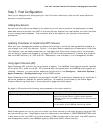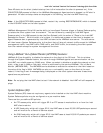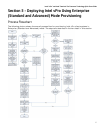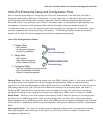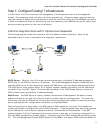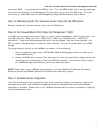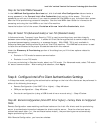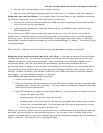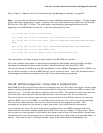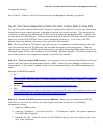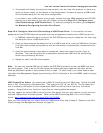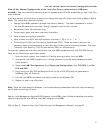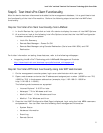Intel® vPro™ and Intel® Centrino® Pro Processor Technology Quick Start Guide
21
Step 3a: Set Intel MEBx Password
In the LANDesk Configuration Services tool, click the Intel vPro Configuration tab and enter a
strong password in the Current Intel vPro Credentials (top) portion of the screen. This is the
password you will use in the future if you need to access the Intel MEBx on any individual client system
after the initial provisioning process is complete. See the Intel MEBx User Guide for information on
accessing and using the Intel MEBx on an Intel vPro machine.
Leave the bottom half of the screen, Provision with new Intel vPro Credentials, blank.
Step 3b: Select TLS (Advanced mode) or non-TLS (Standard mode)
In Advanced mode, Transport Layer Security (TLS) is used to provide privacy and data integrity
between communicating applications. It allows for Client/Server applications to communicate in a way
to prevent eavesdropping, tampering, or message forgery. With LDMS, TLS is only available in
Enterprise Advanced mode provisioning with an Intel vPro machine. The LANDesk core server is used
to issue the certificates to the proper trusted devices within the network.
Under the Discovery & Provisioning portion of the dialog box you’ll find two options related to
encryption:
• Provision in TLS mode for secure communication
• Provision in non-TLS mode
If you are provisioning in Standard mode, select non-TLS mode. For Advanced mode, select TLS mode
for secure communication. After making this selection, click Apply.
Step 4: Configure Intel vPro Client Authentication Settings
In Enterprise mode, configuring the authentication settings on the Intel vPro clients can be performed in
either of the following three ways:
• Remote Configuration (Intel AMT 3.0 or higher) – Step 4A below
• OEM pre-configuration – Step 4B below
• One-touch configuration (using a USB thumb drive or manual entry) – Step 4C below
Step 4A: Remote Configuration (Intel AMT 3.0 or higher) – Factory State to Configured
State
Remote Configuration uses matching certificate hashes on the Intel vPro clients and the provisioning
server to authenticate interaction between the clients and the server. Once the client and server
authenticate each other (i.e., the certificate hashes match), the provisioning server automatically
begins provisioning the client.
With Remote Configuration, you have two choices:



